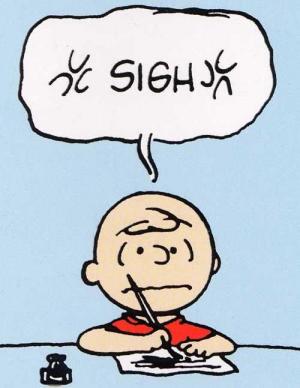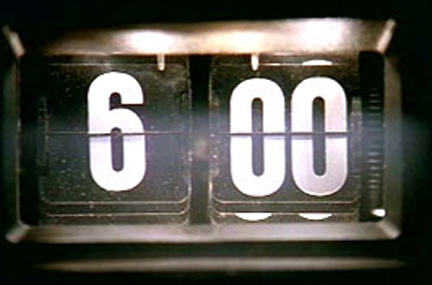 The Pulitzer Prizes were announced yesterday. Needless to say, I didn’t win one, nor was I a finalist, though I was nominated three times, for Pops, my contribution to The Letter, and in my capacity as The Wall Street Journal‘s drama critic.
The Pulitzer Prizes were announced yesterday. Needless to say, I didn’t win one, nor was I a finalist, though I was nominated three times, for Pops, my contribution to The Letter, and in my capacity as The Wall Street Journal‘s drama critic.
As if that weren’t a sufficiently direct lesson in humility, I received in the mail my latest royalty check from Borealis Press. This one (pause for drumroll) was for…$4.06.
Vanity, thy name is someone else. At least until tomorrow. Or maybe next week.
Archives for April 2010
TT: Almanac
“I need not tell you what it is to be knocking about in an open boat. I remember nights and days of calm when we pulled, we pulled, and the boat seemed to stand still, as if bewitched within the circle of the sea horizon. I remember the heat, the deluge of rain-squalls that kept us baling for dear life (but filled our water-cask), and I remember sixteen hours on end with a mouth dry as a cinder and a steering-oar over the stern to keep my first command head on to a breaking sea. I did not know how good a man I was till then. I remember the drawn faces, the dejected figures of my two men, and I remember my youth and the feeling that will never come back any more–the feeling that I could last for ever, outlast the sea, the earth, and all men; the deceitful feeling that lures us on to joys, to perils, to love, to vain effort–to death; the triumphant conviction of strength, the heat of life in the handful of dust, the glow in the heart that with every year grows dim, grows cold, grows small, and expires–and expires, too soon–before life itself.”
Joseph Conrad, “Youth” (courtesy of The Rat)
TT: Lucky man
 I’m up my ears in work in New York, Mrs. T is up in Connecticut taking care of various chores, and neither of these things will be changing until Sunday. As a result, I was feeling more than a little bit grumpy when I sat down in front of the TV on Friday night, surfed the channels, and settled on Groundhog Day, a movie that I love but hadn’t seen in several years.
I’m up my ears in work in New York, Mrs. T is up in Connecticut taking care of various chores, and neither of these things will be changing until Sunday. As a result, I was feeling more than a little bit grumpy when I sat down in front of the TV on Friday night, surfed the channels, and settled on Groundhog Day, a movie that I love but hadn’t seen in several years.
Later that same evening, I emitted a burst of tweets which, stitched together, read as follows:
I’m in the middle of a major writing project (not the Ellington biography) that’s giving me a bad case of the ups-and-downs. What I’d like to do is leave my computer behind and hole up on Isle au Haut for a couple of work-free weeks. Alas, this is not an option. I’ll have to settle for a nice long walk in Central Park, which is far from the worst of a bad bargain.
If you need to adjust your attitude–and I did–a repeat viewing of Groundhog Day will likely do the trick. I laughed and laughed, then found myself overcome with gratitude at film’s end. I’m the luckiest person I know, and sometimes I forget it. Not tonight, though.
To which Lileks responded as follows: “Gratitude! That’s precisely the reaction I have to cheer-inducing, optimistic art. It’s a profound and underrated emotion.” And so it is, especially the latter. Among other things, that’s why Mozart has always been more widely celebrated than Haydn, an equally great composer whose music, though anything but ignorant of the world’s sorrows, is nonetheless fundamentally optimistic and hopeful. Under the aspect of modernity, we prefer our geniuses to be bleak, believing as we do that life is real, earnest, and not infrequently grim. Except that it isn’t, at least not always, and to forget that fact is to commit the soul-shriveling sin of ingratitude.
In a piece I wrote about Haydn for Commentary back in 2005, I quoted the following statement that has been attributed to the composer:
Often when contending with obstacles of every sort that interfered with my work… a secret feeling within me whispered: “There are but few contented and happy men here below; grief and care prevail everywhere; perhaps your labors may one day be the source from which the weary and worn, or the man burdened with affairs, may derive a few moments’ rest and refreshment.” What a powerful motive for pressing onward!
And what an equally powerful motive for seeking to make optimistic art.
The truest and best sentence in Pops: A Life of Louis Armstrong, if I do say so myself, is the one in which I described Armstrong as “a major-key artist who would always be disinclined to lament the woes of the world, aware of them though he was.” I coined the phrase “major-key artist” long ago to describe my old friend Nancy LaMott, who contended with the brutal and debilitating frustration of chronic illness, yet somehow contrived to fill her voice with the sunny warmth of hope each time she raised it in song.
Would that I could do that, or something like it! Alas, I’m merely a craftsman, not a great artist, but at least I can do my best to remind my readers of the life-enhancing virtues of such other joy-inspiring masters as (to name a few off the top of my head) Sir Thomas Beecham, Pierre Bonnard, Emmanuel Chabrier, Noël Coward, Erroll Garner, Howard Hawks, Henri Matisse, Fairfield Porter, and Frank Lloyd Wright. And–lest we forget–Harold Ramis, the director of Groundhog Day, who may not be a master but who has certainly helped make the world a happier and more grateful place.
 As for my own fluctuating gratitude, it ran high all weekend long, fed by Saturday’s glorious sunshine and my first long walk through Central Park in far longer than I care to admit. I am, I know, absurdly lucky, lucky in love and friendship and, perhaps rarest of all, in work. No doubt I spend too much time at the grindstone, but how many people get to earn their living writing books about men like Louis Armstrong and reviews of shows like, say, Gordon Edelstein’s current off-Broadway revival of The Glass Menagerie? And how many working journalists get to change hats in the middle of life and collaborate with a great composer on an opera, then see it produced to perfection and cheered to the echo?
As for my own fluctuating gratitude, it ran high all weekend long, fed by Saturday’s glorious sunshine and my first long walk through Central Park in far longer than I care to admit. I am, I know, absurdly lucky, lucky in love and friendship and, perhaps rarest of all, in work. No doubt I spend too much time at the grindstone, but how many people get to earn their living writing books about men like Louis Armstrong and reviews of shows like, say, Gordon Edelstein’s current off-Broadway revival of The Glass Menagerie? And how many working journalists get to change hats in the middle of life and collaborate with a great composer on an opera, then see it produced to perfection and cheered to the echo?
I haven’t mentioned her lately in this space, so perhaps it’s worth saying that my mother did everything right (other than failing to teach me how to cook). Evelyn Teachout, who turns eighty-one in June, mysteriously neglected to make any of the all-too-familiar mistakes that blight the lives of so many of the people I know. She showed me how to laugh, admired my achievements, brushed off my failures, assured me whenever necessary that pretty much anything I wanted to do in life would be fine with her, and never left me in the slightest doubt of her love. She embedded in me what Freud called “that confidence of success that often induces real success.” You can’t get much luckier than that.
Each day is, of course, its own challenge, and I’m sure that I’ll forget to be grateful for all my good fortune at some particularly exasperating point in the week to come. But this posting, along with others like it that I’ve written in the seven years since this blog opened for business, is meant to serve as a marker, a permanent reminder of my obligation to appreciate all that is good, both in my own life and in the world around me.
Vladimir Nabokov said it: “The cradle rocks above an abyss, and common sense tells us that our existence is but a brief crack of light between two eternities of darkness.” Perhaps–but oh, how lovely a light!
TT: Almanac
“It was as though being in tune with life was an accident that might sometimes befall the fortunate young but was otherwise something for which human beings lacked any real affinity. How odd. And how odd it made him seem to himself to think that he who had always felt blessed to be numbered among the countless unembattled normal ones might, in fact, be the abnormality, a stranger from real life because of his being so sturdily rooted.”
Philip Roth, American Pastoral (courtesy of The Rat)
TT: I’ve seen that show before
I have lukewarm feelings about both of the Broadway shows I reviewed in today’s Wall Street Journal drama column, The Addams Family and Lend Me a Tenor. Here’s an excerpt.
* * *
If you’re a New Yorker with children, or if you’re bringing the family to Manhattan this summer, you’ll have to go to “The Addams Family.” It won’t kill you. You’ll laugh a lot, though never during the unmemorable songs, which are supposed to be funny but aren’t. You’re more than likely to spend a considerable part of the evening wondering how much the set cost. And as you depart the theater, you’ll probably catch yourself wondering whether it was really, truly worth it to take your kids to a goodish musical whose tickets are so expensive that you can buy an iPad for less than the price of four orchestra seats….
If you liked the sitcom and/or the movies, you’ll know just what you’re going to get, right down to the ba-da-da-DUMP (snap, snap) TV-show themelet with which Mr. Lippa’s otherwise anonymous-sounding score begins. The plot, in which young Wednesday Addams (Krysta Rodriguez) falls for a non-creepy boy from Ohio (Wesley Taylor), is as bland as canned tomato soup, and Nathan Lane and Bebe Neuwirth play Gomez and Morticia Addams right down the center (he’s zany, she’s haughty)….
Ken Ludwig writes comfy, low-stakes farces in which no one is embarrassed–at least not for long–and all of the characters live happily ever after. “Lend Me a Tenor,” last seen on Broadway in 1990, is the quintessential example of Mr. Ludwig’s easygoing comic approach, a farce about a production of Verdi’s “Otello” whose star (here played by Anthony LaPaglia) fails to show up for opening night. The plot is properly labyrinthine, the jokes reasonably clever, but never once do you you thrill with sadistic glee as a pompous twit strolls heedlessly toward his well-deserved rendezvous with humiliation. If that’s what you expect from a farce–and I do–you’ll find “Lend Me a Tenor” to be amiable but more then a few teeth short. If not, you’ll like it just fine.
Stanley Tucci is making his Broadway debut as a stage director with this revival. His inexperience shows: The staging, for all its coarsely slapsticky liveliness, isn’t as taut as it ought to be…
* * *
Read the whole thing here.
TT: Almanac
“Two paradoxes are better than one; they may even suggest a solution.”
Edward Teller, Conversations on the Dark Secrets of Physics
TT: So you want to see a show?
Here’s my list of recommended Broadway, off-Broadway, and out-of-town shows, updated weekly. In all cases, I gave these shows favorable reviews (if sometimes qualifiedly so) in The Wall Street Journal when they opened. For more information, click on the title.
Warning: Broadway shows marked with an asterisk were sold out, or nearly so, last week.
BROADWAY:
• A Behanding in Spokane (black comedy, PG-13, violence and adult subject matter, closes June 6, reviewed here)
• Fela! * (musical, PG-13, adult subject matter, reviewed here)
• God of Carnage (serious comedy, PG-13, adult subject matter, reviewed here)
• South Pacific (musical, G/PG-13, some sexual content, brilliantly staged but unsuitable for viewers acutely allergic to preachiness, closes Aug. 22, reviewed here)
OFF BROADWAY:
• Avenue Q (musical, R, adult subject matter and one show-stopping scene of puppet-on-puppet sex, reviewed here)
• The Fantasticks (musical, G, suitable for children capable of enjoying a love story, reviewed here)
• The Glass Menagerie (drama, G, too dark for children, closes June 13, reviewed here)
• Our Town (drama, G, suitable for mature children, reviewed here)
• The Temperamentals (drama, PG-13, adult subject matter, reviewed here)
CLOSING SOON OFF BROADWAY:
• The Orphans’ Home Cycle, Parts 1, 2, and 3 (drama, G/PG-13, too complicated for children, now being performed in rotating repertory, closes May 8, reviewed here, here, and here)
CLOSING NEXT WEEK OFF BROADWAY:
• The Cocktail Party (drama, PG-13, adult subject matter, closes Apr. 17, reviewed here)
TT: Almanac
“There is a God. There is no God. Where is the problem? I am quite sure that there is a God in the sense that I am sure my love is no illusion. I am quite sure there is no God, in the sense that I am sure there is nothing which resembles what I can conceive when I say that word.”
Simone Weil, Waiting for God (courtesy of Laura Good)
